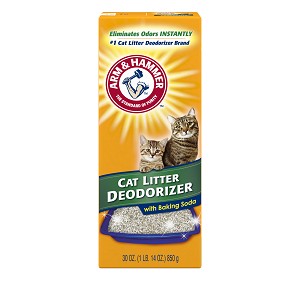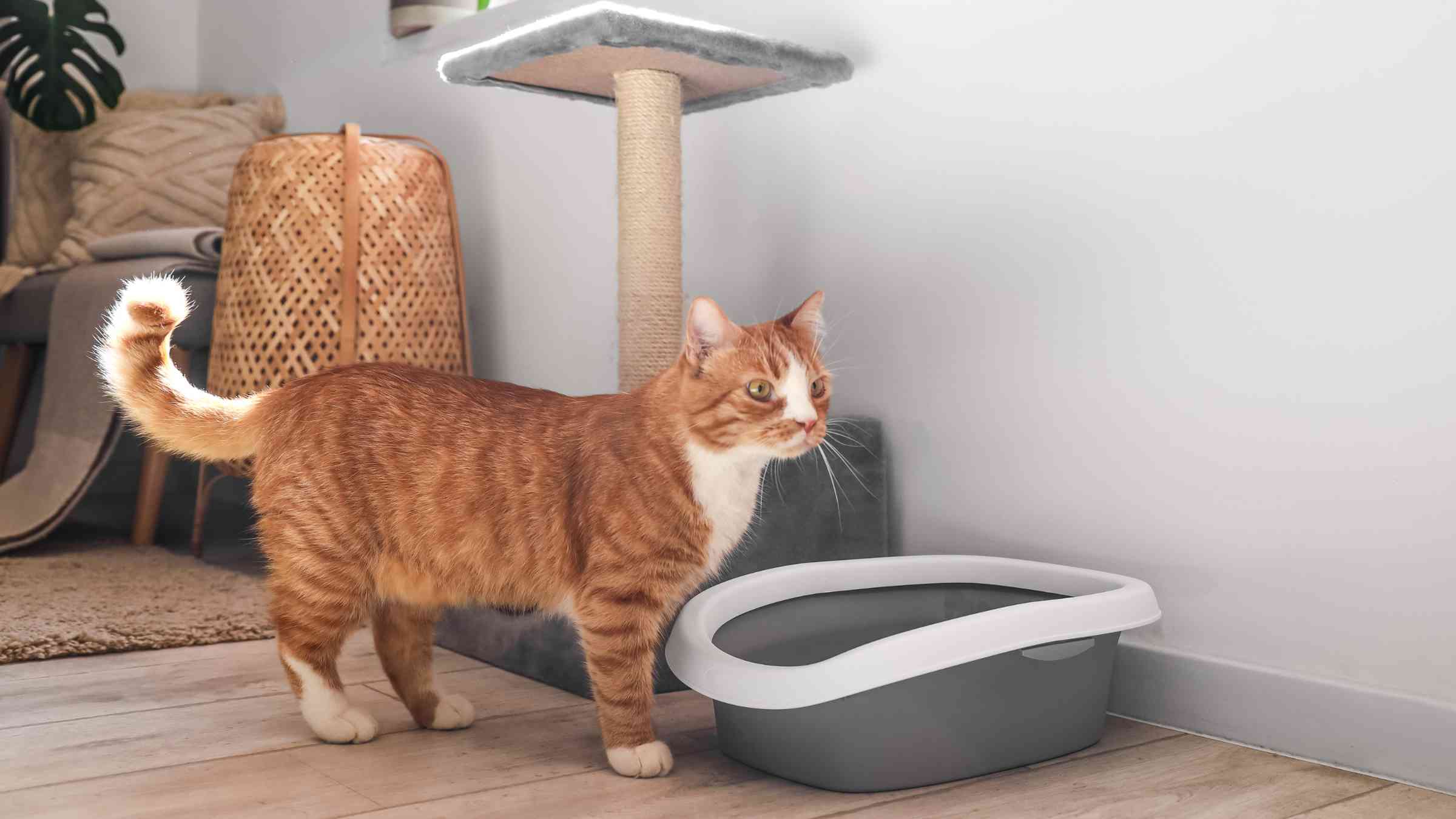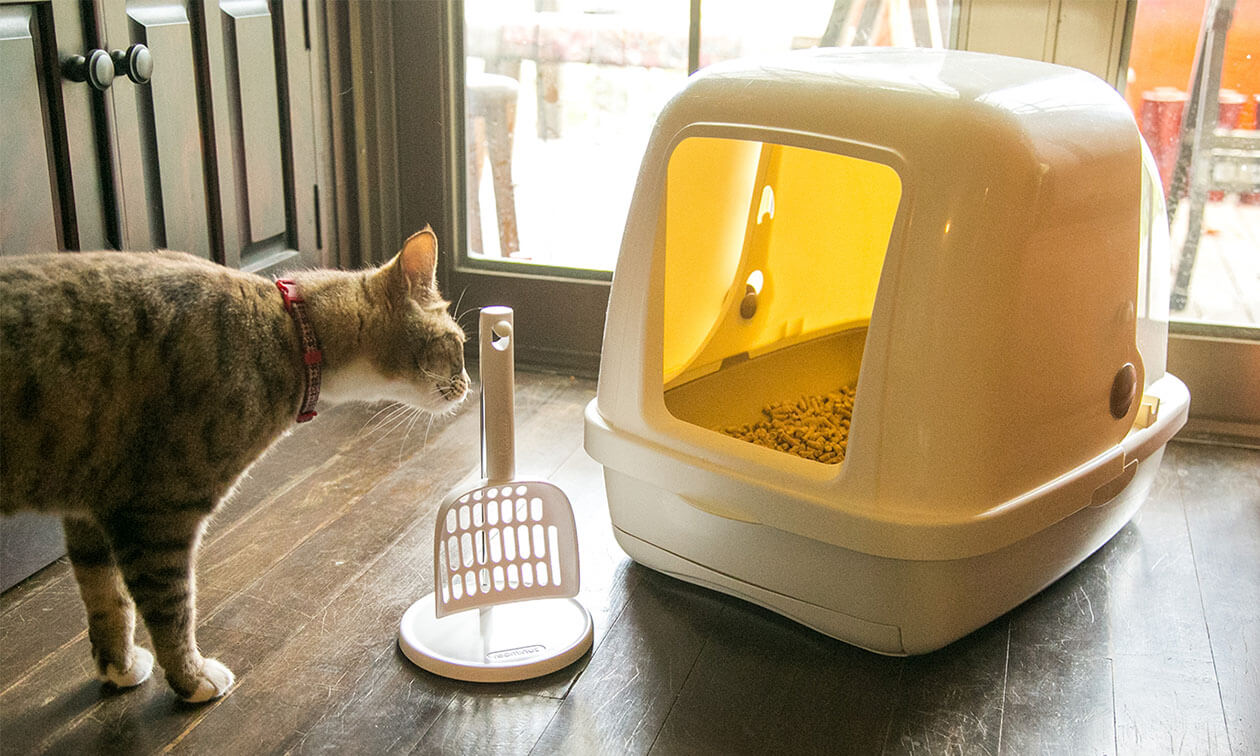Do you dread walking past your cat’s litter box because of the unpleasant odor? You’re not alone.
Many cat owners face the challenge of managing litter box smells, which can quickly take over your home. But what if you could enjoy your furry friend’s company without the unwanted scents? Imagine inviting guests over without worrying about that unmistakable odor.
In this guide, you’ll discover simple yet effective strategies to keep your cat’s litter box fresh and odor-free. Say goodbye to embarrassment and hello to a home that smells just the way you like it. Ready to transform your space? Let’s dive in.

Credit: www.armandhammer.com
Choosing The Right Litter
Choosing the right litter is crucial in your quest to reduce cat litter box odor. It’s not just about picking a random bag off the shelf. The right choice can transform your home environment and keep your feline friend happy.
As a cat owner, I once struggled with the pungent scent wafting from the litter box. I realized that the problem wasn’t my cleaning routine; it was the litter itself. Let’s explore how you can make a better choice.
Types Of Cat Litter
Cat litter comes in various types, each with unique features. Clumping litter is popular for its ease of cleaning. It forms solid clumps when wet, making it simple to scoop out soiled bits.
Non-clumping litter, on the other hand, absorbs moisture but doesn’t form clumps. While it may require more frequent full changes, it can be an economical option. Silica gel litter has excellent odor control but may not be preferred by all cats.
Try different types to see what works best for you and your cat. Is your current choice more hassle than it’s worth?
Litter Materials And Their Benefits
The material of the litter plays a significant role in odor control. Clay litter is highly absorbent and often includes added deodorizers. However, it can be dusty, which might not be suitable for sensitive cats or owners.
Biodegradable options such as corn, wheat, or pine are gaining popularity. They are eco-friendly and offer natural odor control without harsh chemicals. Another option is recycled paper litter, which is dust-free and gentle on paws, though it may need frequent changing.
Have you considered the environmental impact of your litter choice? Sometimes, a switch to a natural material is the best solution for both odor and sustainability. Are you ready to make the change?
Regular Cleaning Routine
Maintaining a regular cleaning routine is crucial for minimizing cat litter box odor. It’s not just about keeping the box clean, but also about ensuring your feline friend feels comfortable. A well-planned routine can make a huge difference in your home’s overall freshness. Let’s dive into some practical steps you can take to keep those unwanted smells at bay.
Daily Scooping
Daily scooping is your first line of defense against unpleasant odors. Imagine coming home after a long day only to be greeted by the overpowering smell of a dirty litter box. Not fun, right? By making it a habit to scoop out waste every day, you can prevent odors from building up and spreading throughout your home.
Set a specific time each day for scooping, perhaps after breakfast or before bed. This way, it becomes a natural part of your routine. You might even find it calming, knowing you’re doing something beneficial for both your cat and your living environment.
Consider investing in a quality scoop that gets the job done efficiently. You’ll thank yourself for it when you’re able to scoop quickly without leaving behind any residue.
Weekly Deep Cleaning
A weekly deep clean is essential for maintaining long-term odor control. Think of it as hitting the refresh button for your cat’s litter box. Remove all the litter and thoroughly wash the box with warm, soapy water. This not only banishes lingering smells but also helps prevent bacteria buildup.
You might wonder why a simple scoop every day isn’t enough. Well, even the best scooping technique can’t remove all waste residue. A deep clean ensures you start each week with a fresh, odor-free environment.
Once the box is dry, add fresh litter. You might even consider sprinkling some baking soda at the bottom to further absorb odors. Have you tried this trick before? It can be surprisingly effective.
By following these steps, you can maintain a clean, odor-free space for both you and your cat. So, what’s stopping you from embracing this routine today?
Litter Box Placement
Finding the right spot for your cat’s litter box can make a big difference in managing odor. Proper placement not only helps control smells but also ensures your cat feels comfortable using it. Have you ever noticed how some areas of your home seem to amplify odors? This is why choosing an ideal location is crucial.
Ideal Locations
Think about quiet corners of your home. Basements, laundry rooms, or a spare bathroom can be perfect. These spots are typically away from the main living areas, reducing the chance of odor reaching your nose.
Consider ventilation. A well-ventilated area can help disperse odors more effectively. Have you ever opened a window and noticed how fresh the air becomes? This same principle applies to litter box placement.
Avoiding High Traffic Areas
High traffic areas are not ideal for litter boxes. Places like hallways, kitchens, or living rooms should be avoided. These areas can expose your cat to too many distractions, making them less likely to use the box.
Think about your own experiences. Would you like to do something private in the middle of a busy hallway? Your cat feels the same way. Choose a spot where they can have some peace and quiet.
Remember, your cat’s comfort is key to consistent litter box use. Have you ever noticed your cat searching for a quiet spot to nap? They’ll appreciate the same consideration for their litter box.
Reflect on your home layout. Is there an area that’s both quiet and well-ventilated? This could be your solution to reducing litter box odor. What steps can you take today to make this change?

Credit: soykitty.com
Using Odor Control Products
Dealing with cat litter box odor is a challenge every cat owner knows well. Luckily, you can fight back by using odor control products designed to keep your home smelling fresh. These products come in various forms, each with its unique benefits. Let’s dive into some effective solutions to make your litter box area a more pleasant place.
Deodorizers And Sprays
Deodorizers and sprays are like magic wands for your litter box. They are easy to use and can make an immediate difference. Picture this: you just cleaned the litter box, and within minutes, the unpleasant smell starts creeping back. A quick spray can neutralize that odor in seconds.
Many sprays come with fresh scents like lavender or citrus, transforming your space into an inviting area. You might find yourself spending more time where the litter box is, just because it smells so nice!
But be cautious about the chemicals in these products. Some cats are sensitive and may react negatively. Always check for pet-safe labels to ensure you’re not compromising your cat’s health for a pleasant aroma.
Natural Alternatives
Not a fan of chemical sprays? You’re not alone. Luckily, there are natural alternatives that are equally effective. Baking soda is a fantastic option. Just sprinkle some into the litter box after cleaning, and it will absorb odors naturally.
Another great option is activated charcoal. It works wonders by trapping smells without any artificial scents. If you’re curious about going green, consider making a DIY mixture with essential oils like peppermint or eucalyptus. These oils can provide a refreshing smell while keeping things natural.
Have you ever tried using green tea leaves? They can act as a natural deodorizer, offering a subtle fragrance that you might find surprisingly pleasant. It’s a win-win for both you and your feline friend!
When choosing between these methods, think about your lifestyle. Do you prefer a quick fix or a more natural approach? Either way, the goal is to create a comfortable environment for both you and your kitty.
Diet And Health Considerations
Keep cat litter box odor in check by choosing quality litter and cleaning regularly. Consider diet changes to reduce waste smell. Ensure proper ventilation around the box for fresher air.
Are you tired of the persistent odor from your cat’s litter box? Diet and health considerations play a significant role in managing this challenge. Understanding how what your cat eats and their overall health can impact litter box odor is essential. It’s not just about what you scoop out; it’s also about what goes into your cat’s bowl and what might be happening with their health.Impact Of Diet On Odor
The food you choose for your cat can directly affect the smell of their litter box. Cats on a high-quality diet often have less odorous waste. Look for foods with real meat as the first ingredient and avoid artificial fillers. Adding wet food to your cat’s diet can help too. It increases their water intake, which can result in less concentrated urine. Have you ever noticed a difference when you switch up your cat’s food? Consider keeping a food diary to track changes. Feeding your cat smaller, more frequent meals might reduce odor as well. It helps with digestion and can lead to less waste in the litter box. Plus, it mimics a cat’s natural eating habits in the wild.Monitoring Health Issues
Health issues can also contribute to unpleasant odors in the litter box. If you notice a sudden change in smell, it might be time to visit the vet. Urinary tract infections or digestive issues can cause stronger odors. Regular vet check-ups can help catch these issues early. A healthy cat usually has consistent litter box habits, so any changes are worth investigating. Have you ever ignored a change in your cat’s litter box habits and later regretted it? Keep an eye on your cat’s behavior, too. If they seem uncomfortable or are visiting the litter box more often, it could be a sign of a health issue. Addressing these problems can lead to a fresher-smelling litter box and a happier cat. Balancing diet and health is key to reducing litter box odor. What changes will you make to keep your home smelling fresh and your cat feeling great?Ventilation And Airflow
Ventilation and airflow play a crucial role in reducing cat litter box odor. Fresh air can help disperse unpleasant smells and maintain a pleasant home environment. With the right strategies, you can improve ventilation and keep odors at bay.
Improving Air Circulation
Place the litter box in a well-ventilated area. Avoid cramped spaces or corners. Open windows regularly to let fresh air in. This will help to naturally dissipate odors. Use vents to encourage airflow in confined spaces. Even small changes can make a big difference.
Using Fans Or Air Purifiers
Install a small fan near the litter box. This helps to circulate air and reduce odor buildup. Choose a fan with adjustable speeds for better control. You can also consider using an air purifier. Look for models designed to remove pet odors. These devices trap odor particles and freshen the air. They are a useful addition to any home with pets.
Behavioral Training For Cats
Training cats to use the litter box properly can help reduce unpleasant odors. Regular cleaning of the litter box and choosing high-quality litter are essential steps. Encouraging good litter habits in your feline friend can lead to a fresher home environment.
Cats are curious creatures, and their behavior can have a big impact on how effectively they use the litter box. Understanding and modifying this behavior is key to reducing unpleasant odors. Let’s dive into how you can encourage your feline friend to use the litter box properly and address any litter box avoidance issues.Encouraging Proper Use
Cats are creatures of habit, and establishing a routine can greatly assist in encouraging proper litter box use. Start by placing the litter box in a quiet, accessible location. Cats appreciate privacy, and a calm environment helps them feel secure. Keep the litter box clean. Scoop daily and replace the litter regularly. A clean box is more appealing and reduces the chance of unpleasant smells developing. Observe your cat’s litter preferences. Some cats prefer clumping litter, while others might lean towards a more natural option like pine. Experiment to see what your cat prefers, and stick to it.Addressing Litter Box Avoidance
When your cat starts avoiding the litter box, it’s essential to identify the cause. Stress or anxiety can trigger this behavior. Have there been recent changes at home, like a new pet or a move? Medical issues could also be a factor. If your cat suddenly stops using the litter box, consult with your vet to rule out any health concerns. Sometimes, the litter box itself can be the problem. Is it too small or difficult for your cat to enter? Upgrading to a larger or lower-sided box might be the solution. Consider your cat’s feedback. Cats communicate in subtle ways, and addressing their needs can eliminate litter box avoidance while keeping your home odor-free. Have you tried any of these methods with your cat? Share your experience and see if others have faced similar challenges. Your insights could be the key to helping another cat owner solve their litter box woes.
Credit: www.zoetispetcare.com
Frequently Asked Questions
Is It Okay To Put Baking Soda In Cat Litter?
Yes, adding baking soda to cat litter is safe. It helps neutralize odors effectively. Use a small amount mixed with the litter. Ensure your cat isn’t allergic. Check the litter box regularly to maintain freshness.
How Do I Make Sure My House Doesn’t Smell Like A Litter Box?
Clean the litter box daily and use odor-absorbing litter. Ventilate your home to reduce smells. Place air fresheners or natural odor absorbers nearby. Consider using an enclosed litter box to contain odors. Regularly wash and replace litter box liners for freshness.
What Is The Best Odor Eliminator For Cat Litter Box?
The best odor eliminator for cat litter boxes is baking soda. It neutralizes smells effectively and is safe for pets. Mix it with litter or purchase litter with baking soda included for optimal results. Regular cleaning also helps maintain a fresh environment.
How Can I Reduce Cat Litter Box Odor Effectively?
To reduce litter box odor, clean it daily and use clumping litter. Ensure proper ventilation in the area. Consider using a litter box deodorizer or baking soda. Regularly wash the litter box with mild soap and water to remove bacteria.
Maintaining cleanliness will significantly reduce unpleasant smells.
Conclusion
Reducing cat litter box odor is achievable with consistent care. Clean the box daily to prevent buildup. Choose the right litter for better odor control. Regularly replace and sanitize the box to keep smells at bay. Ensure proper ventilation in the litter area.
Consider using baking soda for extra freshness. Your cat’s diet can also affect odor, so opt for quality food. With these simple steps, a fresher home environment is possible. Enjoy a pleasant space for both you and your feline friend.
